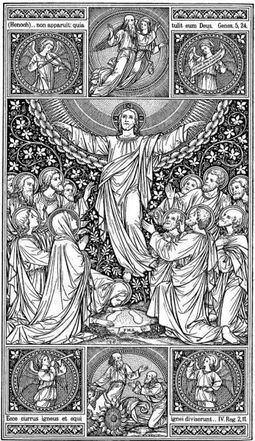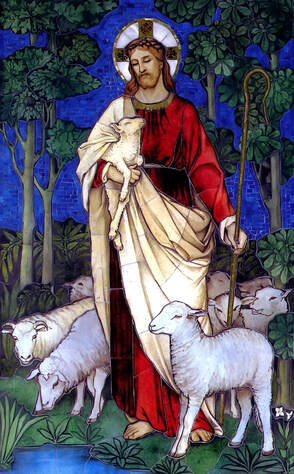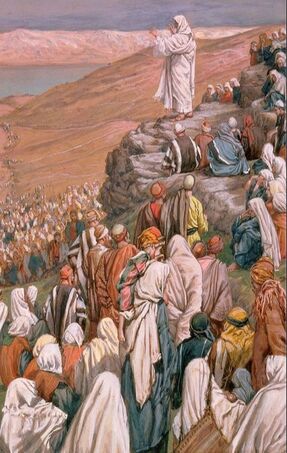
When St. Aloysius had been ill for a long time, the physician, seeing that he was drawing near his end, told him that he could not depend on more than eight days to live. Just then one of his companions came into the room where St. Aloysius lay. "Oh!" he cried out with great joy, "did you hear the news? The doctor has just told me I cannot live longer than eight days. Oh ! come, let us sing a hymn of joy to thank God: the danger of losing my soul will soon be past."
He then wrote a letter to his mother, in which he said: "My dearest mother, I have good news to give you today, and I am sure you will rejoice with me. I am now near the end of my life,—near the time when there shall be no longer any danger of my losing my soul. As for myself, I look upon death as the greatest blessing God could bestow upon me, and I ask you to join me in thanking Him."
Children, what a joyful moment, it will be for you, if, at the last day of your life, when the moment of your judgment comes, you hear these words from the lips of the Great Judge: "Come, thou blessed of my Father, possess the kingdom which was prepared for thee from the foundation of the world." Yet, those who persevere till the end of their lives in the service of God shall one day most certainly hear these blessed words.
Just for a little while we enjoy temporal goods, such as money, honors, comfort. How perishable is beauty; it is just like a flower, it appears today in all its splendor and tomorrow it withers and falls blighted to the ground. How fickle are riches, money, real estate, and stocks ! They can be taken from us by bad men or lost by mishaps. How fleeting are honors and dignities! The wheel of fortune ever turns; today you may be in the first place and tomorrow you may be shifted to the last place. How foolish to plunge ourselves into eternal perdition for the sake of the fleeting and vain goods of the world.
On my travels through the West I met a young boy who was dressed like a soldier. He was only about thirteen years old, and I said to him, "Why, little fellow, how does it happen that you are a soldier?" "I'm not a soldier," he said very proudly, "I am a scout." And sure enough, that's just what he was, with his soldier suit and his strong staff.
Of course you know what a scout is. A scout is taught to be manly, to serve his country, to love God and to do a good turn every day. He is taught to know the weather signs, to find his way at night by the stars, to track men and animals, to hide himself, to signal across the water and from hilltops, to make tents and fires and camp beds, to sleep in the open air, and a thousand other useful things. But the great principle he has to observe is to do a kind act every day.
The motto of all scouts is, "Be prepared" It is a good motto. If you are going to do the world's work, you must have steady nerves and strong muscles. If you are going to take your part in the battle for peace and purity, you must have educated brains and trained minds. If you are going to help God make the world better, you must prepare yourself for service and be ready when He calls. It took Jesus thirty years' preparation to get ready to do three years' work.
See to it that you do not waste your play-days, but get a strong body while you are a boy. Don't waste your school days, but get a strong mind before it is too late. Don't waste your church and Sunday school days, but get ready a strong heart, and conscience, and character, so that you will be ready when God calls you. God will surely call you. Do not be afraid of that. Only be sure you are ready when He does call. "Be prepared."
During his whole life upon earth Christ was going to the Father. Children, may we be able to say with confidence, when about to die: I go to the Father. We shall be able to do so, if now we go to the Father; if we frequently and with joy think of the Father, love to hear His holy word, diligently visit Jesus in the tabernacle,' pray devoutly, and walk in the way of His commandments. Examine yourselves and see whether in such a manner you go to the Father. How deplorable would be your lot if all your life you were on your way to the devil. Do you not shudder at the thought of being obliged at the end of your life to say: "I go to the devil"?
May the God of mercy preserve us all from such a calamity. When St. Teresa was a little girl, not more than seven years old, she used to spend much of her time with her little brother Roderick in reading the Lives of the Saints. The thought of eternity made a deep impression upon their young hearts, and they were never tired of repeating these words: "Forever, for ever, for ever! What! shall the blessed see and enjoy God for ever!" When they read the history of the monks and hermits, they wished like them, to abandon all for God, and tried to build themselves little hermitages in their father's garden, but being only small and weak, they were not able to finish them. It was the history of the martyrs, however, which filled them with the greatest delight. It seemed to them that the martyrs had purchased Heaven very cheaply, since by short sufferings they had secured eternal joys. They wished that they could do all the same and one day, set out severally from home and left the city, intending to make their way to the country of the Moors, to become martyrs. It was, of course, wrong to do this without even asking their parents' permission. As they went along, praying with great fervor, they were met by one of their uncles, and he brought them back to their mother, who was in a state of great distress. Teresa did not escape without a scolding; but Almighty God was, no doubt, pleased with her innocent fervor and forgave her for her fault.
Look upon the Apostles; great was their sorrow for the loss of Jesus, but after three days it was turned into joy, and now they are enthroned in Heaven and enjoy, after the tribulations of this short earthly life, the blessed happiness of Heaven. Take, then, your cross upon your shoulders, and carry it courageously after Jesus, and your heart shall rejoice, and your joy no man shall take from you.
Source: Story Sermonettes for the Children's Mass, Imprimatur 1921




 RSS Feed
RSS Feed